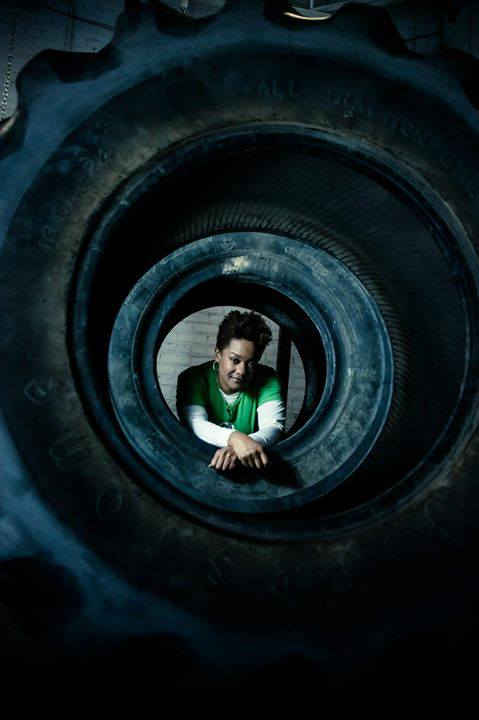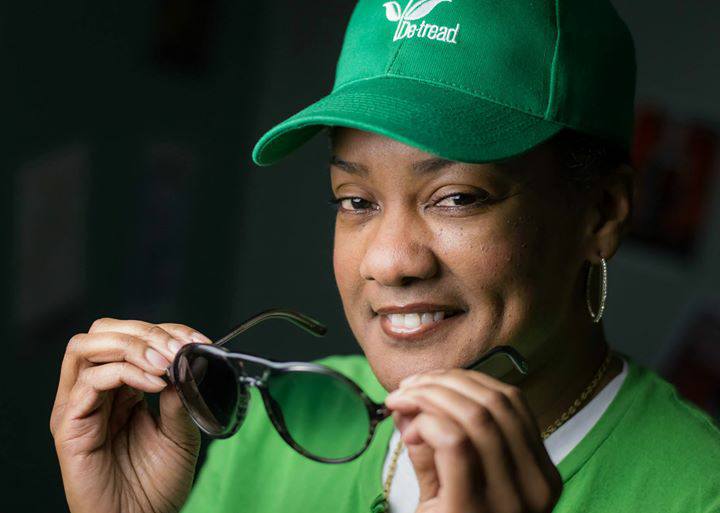
Audra Carson is proof that one person’s blight can become another person’s opportunity. And therein lies the difference between an entrepreneur and your regular everyday person. Carson is far from the only Detroiter to get upset about the seemingly hundreds of ‘dead’ tires tossed randomly about the city into vacant lots, alleys, and just about anywhere else in the city’s numerous rundown neighborhoods where the number of occupied homes are matched – and sometimes overmatched – by blasted out skeletons and empty lots. But rather than staying stuck on complain, Carson decided this was a job for an entrepreneur. A female entrepreneur. From Detroit.
And that’s how De-Tread was born…
Q: Tell us a little bit about your business. It’s De-tread.
A: Born and raised in the city of Detroit. Just an overabundance of love for the city and the entrepreneurial journey that I’ve taken allows me to even just write my own love letter to the city of Detroit. Basically they call me the tire nerd and as we talk you guys will probably figure that out. Just wanting to do something and leave an impact and a legacy for the city that I love.
Q: Our colors at Cass Tech were green and white, so you are dressed appropriately! Talk about, speaking of education, where you went to school and your first career, which was in corporate America.
A: I went on to Olivet College in Olivet, Michigan, which is a small, Lutheran, private college. That was the choice because at the time I was painfully shy and my parents wanted me to go somewhere small. That’s where I ended up. The second part of your question?
Q: How you got into your first career in corporate America?
A: Okay. Just took the natural progression from going to college. My parents wanted me to have a nice, stable, regular job. I went from college to MetLife and I was a business analyst there. Then I transitioned to another healthcare provider, where I was a business analyst there for over 15 years before I decided to make a change.
Q: Speaking of that, even before you left corporate America, how in the world did you get into recycling tires?
A: Well, the story is, Pamela, and I’ve always said this, De-tread chose me. I didn’t choose it. I was seeing what was happening in the community that I grew up in. My parents still live there. They still thrived. I love that community and it was beginning to be a dumping ground for tires. Around that same time, there was a story on HGTV, where a guy was making mulch from tires. I’m like, “Wow. That’s possibly a solution. I’m like, “Well, if he can do it,” you know I’m from Detroit, “I should be able to do it.” At the time, I felt like I needed someone else to assist me and so I asked the gentleman that I was dating at the time, “Would you like to go into business?” He didn’t feel it and I asked one of my girlfriends. She didn’t feel it. My older brother, who is now deceased, he told me, he said, “I believe you need to make this path and go down this journey alone.”Even if you’re scared, do it alone. Around 2009 is when De-tread was formed. The goal was to have a tire processing facility in the city of Detroit, to pay people well.

Q: You wanted to employ others?
A: We wanted to employ others. That was the goal and this tire processing facility, you take this form of waste that most people don’t even really think about. You go and you buy a new tire. You don’t figure, you don’t even wonder where it goes afterwards. To take this tire waste and to create a product or products from that. I’m still along that path of having that state-of-the-art facility. Because of that, my path has meandered a little bit. It’s changed, but it’s unfolded the way that it’s supposed to unfold. As I stated, I know that this is what I’m supposed to do. A second company has been formed out of that, where it’s an extension of what I was already doing. The second company is Izzie Logistics and Distribution. Basically at the core of that is beautification. The first and foremost form of beautification is remediation of tires. Most people don’t know. They may not live in an urban core or a rural environment. People feel like it’s okay to dump tires. They dump them by the hundreds. They dump them because it’s a cost associated with the disposal of those tires, so to mitigate the cost, they just feel that they can dump these tires anywhere.
Q: Just dump them anywhere in the city. They don’t care. They just see an open space and just dump them there.
A: Yes. With having the experience that I have in this industry and it’s truly a nontraditional industry for a woman, a black woman, what happens is it’s the impact of those tires being dumped. It’s four layers to that impact. You have the environmental because the tires leach into the soil. You have the composition of the tire. It has oils and synthetics and that sort of thing. When tires sit for a long period of time, most often they have water in them and we’ll talk more about that water a little later, but so they freeze and they heat and they freeze and they heat. They off gases. They combine with that water and so they leach into the soil. You have an issue where your soil is being compromised in a very great way, for the communities.
Back to that water and that rain, once water gets in the ring of the tire, you can’t get it out unless that tire’s cut. In the mean time, it houses mosquitoes, which potentially carry disease. A pile of tires can be a house for rodents, which also carry disease. Health and safety, another layer of that is the potential for fire. Because of the composition of tires, they are extremely flammable. Once they become engulfed in flame, they’re very, very difficult to extinguish. The last layer that people don’t even really think about is what does it do to the children who live in these neighborhoods, who believe that this is normal to have to navigate around a thousand tires to get to school or their parents or grandparents. Their street is blocked. Because it’s a mountain of tires. What does that do to the psyche of those children? Does it diminish their desire to reach their highest height? It’s a societal issue as well.